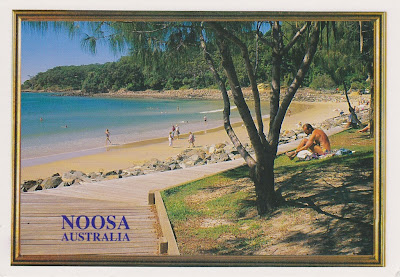On this blog you can see postcards I have received via postcrossing. If you are interested in getting postcards from different people from various countries, have a look at www.postcrossing.com
 The Grampians National Park (also Gariwerd) is a national park in Victoria, Australia, 235 kilometres west of Melbourne. The Grampians feature a striking series of sandstone mountain ranges. The highest peak is Mount William at 1167 metres. Numerous
waterfalls are found in the park and are easily accessible via a well-developed
road network. In spring the Grampians wildflowers are a major attraction. The area is a
noted rock climbing destination, and it is popular with campers and bushwalkers for its many
spectacular views and unspoilt nature.
The Grampians National Park (also Gariwerd) is a national park in Victoria, Australia, 235 kilometres west of Melbourne. The Grampians feature a striking series of sandstone mountain ranges. The highest peak is Mount William at 1167 metres. Numerous
waterfalls are found in the park and are easily accessible via a well-developed
road network. In spring the Grampians wildflowers are a major attraction. The area is a
noted rock climbing destination, and it is popular with campers and bushwalkers for its many
spectacular views and unspoilt nature. A cute stamp.
A cute stamp. Australia
Australia Noosa
Noosa Karijini national park
Karijini national park
 The Great Ocean Roadis an Australian National Heritage listed 243-kilometre (151 mi) stretch of road along the south-eastern coast of Australia between the Victorian cities of Torquay and Warrnambool. The road was built by returned soldiers between 1919 and 1932, and is the world's largest war memorial; dedicated to casualties of World War I. It is an important tourist attraction in the region, which winds through varying terrain alongside the coast, and provides access to several prominent landmarks; including the nationally significant Twelve Apostles limestone stack formations.
The Great Ocean Roadis an Australian National Heritage listed 243-kilometre (151 mi) stretch of road along the south-eastern coast of Australia between the Victorian cities of Torquay and Warrnambool. The road was built by returned soldiers between 1919 and 1932, and is the world's largest war memorial; dedicated to casualties of World War I. It is an important tourist attraction in the region, which winds through varying terrain alongside the coast, and provides access to several prominent landmarks; including the nationally significant Twelve Apostles limestone stack formations.
 Cradle Mountain
is a mountain in the Cradle Mountain-Lake St
Clair National Park, Tasmania,
Australia. Rising to 1,545 metres
(5,069 ft) above sea level, it is one of the principal tourist sites in
Tasmania, owing to its natural beauty. The Cradle Mountain is composed of dolerite columns,
similar to many of the other mountains in the area. The mountain rises above
the glacially formed Dove Lake (934 metres (3,064 ft)), Lake
Wilks, and Crater
Lake. The mountain has four
named summits. In order of height they are Cradle Mountain (1,545 m (5,069 ft));
Smithies Peak (1,527 m (5,010 ft)); Weindorfers Tower (1,459 metres (4,787 ft));
and Little Horn (1,355 m (4,446 ft)). The mountain itself is
named after its resemblance to a gold mining cradle. The area is covered in a wide variety of alpine and sub-alpine vegetation.
Cradle Mountain
is a mountain in the Cradle Mountain-Lake St
Clair National Park, Tasmania,
Australia. Rising to 1,545 metres
(5,069 ft) above sea level, it is one of the principal tourist sites in
Tasmania, owing to its natural beauty. The Cradle Mountain is composed of dolerite columns,
similar to many of the other mountains in the area. The mountain rises above
the glacially formed Dove Lake (934 metres (3,064 ft)), Lake
Wilks, and Crater
Lake. The mountain has four
named summits. In order of height they are Cradle Mountain (1,545 m (5,069 ft));
Smithies Peak (1,527 m (5,010 ft)); Weindorfers Tower (1,459 metres (4,787 ft));
and Little Horn (1,355 m (4,446 ft)). The mountain itself is
named after its resemblance to a gold mining cradle. The area is covered in a wide variety of alpine and sub-alpine vegetation.
Žádné komentáře:
Okomentovat